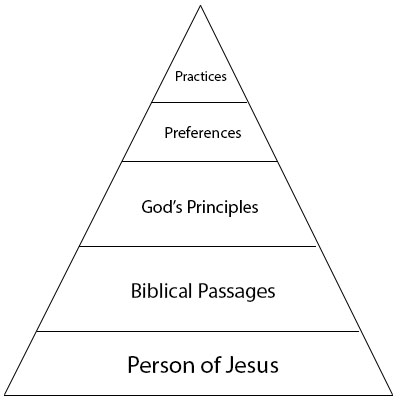As we look at the pyramid of unity, we have covered the bottom three foundational areas that define unity. We have to be together and unified around the person of Jesus, the authority of the Bible, and God’s principles.
Today we begin discussing the top two sections of the pyramid. And these two areas are being defined by the diversity that we will have in the church. While our preferences and practices can be diverse, it is also a source of unity.
There is a caution in the diversity. Because sometimes a preference can be made sacred, and as such cause division instead of diversity. People bring a lot of strong emotion to their preferred preferences and practices.
Paul addressed in his writings some of the outside preferences that were coming into the church. Be warned that while there is no hard rule regarding practices, to be careful that it doesn’t override the truth of Jesus. Today, we will look at what Paul said to the Philippians. All of us have our unity by receiving comfort in God’s love. We are to all stand together. The principle is that we all stand together under the umbrella of God’s love. And then he goes into a precept of being like minded.
The immediate reaction to this precept is that we all have to think the same. But Paul will go on to debunk this idea, and he will explain what being like-minded means. Being of the same love, spirit, and mind. Being fused together in unity.
Paul instructs that we do not act out of the feelings that we have. It is OK that we have feelings, but we cannot act out of that. But rather we are to value others above ourselves. Can you imagine if all of us come to every situation with the idea that we will treat the other person above yourself? Can you imagine a church fight, “You are more important than me!” “No! You are more important than me!”
This isn’t to say you are to think lower of yourself but to think higher of the other person. Did you know that your self-esteem can improve by treating others of higher regard?
To flush out how we operate in our lives and in the church, it can be very challenging. Many times we can see preferences overriding our principles when it comes to music in the church. We might not listen to organ music in our everyday listening. But we listen to it in appreciation that it is a part of us. The interesting thing is that we all find our preferences and practices change over time. We might look back 20 years and ask ourselves why we liked something.
Here are some things to think about as we conclude our conversation of preferences and practices:
- Preferences must be grounded in and flow from God’s principles.
- Preferences must not be elevated to the place of sacred.
- Preferences give us the opportunity to enjoy our diversity.
- Forced preferences may bring uniformity but not unity.
2:1 So if there is any encouragement in Christ, any comfort from love, any participation in the Spirit, any affection and sympathy, 2 complete my joy by being of the same mind, having the same love, being in full accord and of one mind. (ESV)
3 Do nothing from rivalry or conceit, but in humility count others more significant than yourselves. 4 Let each of you look not only to his own interests, but also to the interests of others. (ESV)


